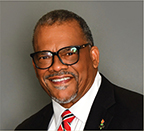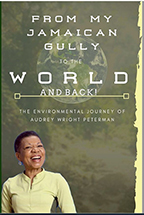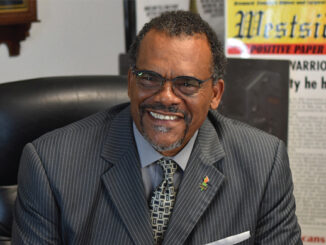
A Message From The Publisher
Life strikes without warning and can leave large emotional chasms to be filled with at times bittersweet memories, thank God that for our friends Audrey and Frank theirs were filled with a warning and another chance to gather some thoughts to being alive. Yet on the other hand the people in Acapulco were not. God bless all life and the moments we have
to appreciate them.
—Bobby R. Henry, Sr.
Hurricane Otis shows: No warning will be given!
By Audrey Peterman
When an earthquake struck Jamaica Monday morning, October 30, my husband Frank and I were in bed watching sports and scrolling through our phones. The first shudder, followed by the first hard shake, had me launching into his arms, my eyes reflecting the alarm in his. It felt like our entire apartment building was lifted up and sat back down again, thankfully with care as we hang over a cliff. We heard things falling off the shelves in the living room and breaking.
It may only have been 30 seconds though it felt like 30 minutes before it stopped and we began to relax. When I could get out of bed I went straight to the closet and pulled out our “go bag” to make sure we have the essentials: First-Aid Kit; Passport, ID and contact list in waterproof bag; afull change of clothes; medicine; a flashlight and batteries; bleach to purify water, matches in a waterproof bag and lighter, cash in small denominations. Relieved that everything was in order, we got up the courage to check out the living room. Thankfully only a few things broke.
I’m sharing this story not to illustrate that we had a modest earthquake – a 5.4. That would almost be selfish when so many disasters are happening around the world. My point is to share that there is a level of readiness that each one of us must have, from the individual level to the entire country, because Hurricane Otis illustrated that we no longer have a way of knowing what’s coming ahead of time. We may not have time to prepare. The only answer is to stay prepared.
As an environmental communicator since 1995, I expect everyone else to be as concerned as me about the deterioration of our climate. (If someone tells you your house is on fire, aren’t you going to do everything you can to save it?) But I know that it’s a fundamental flaw of environmentalists and planners to expect that everyone knows and should be concerned. This results from the fact that we’re mostly talking to each other and our own circles. Because they’re informed, we presume that the general public is equally informed.
For 28 years we have advocated for a public information campaign that reaches people through any media they use, including music, to let people know what’s really at stake. It’s really vital now.
The people in Acapulco who are slogging through sheets of mud, dying of hunger and thirst in what was once a luxury resort city may not have thought much about the fact that last summer was the hottest on record. Nor might they have known that the overheating in the North Atlantic would so devastatingly affect them. That heat allowed Hurricane Otis to morph from a mild tropical storm into a ferocious monster in just 24 hours.
They may have assumed that, facing such a dire threat, they would get warning and have at least a week to prepare. But the storm took the forecasting community by shock, causing them to say, “This is beyond extreme.” Otis showed that we must get ready and stay ready to have the best chance of surviving individually, as communities and a nation. It is imperative that everyone should check with the Disaster Preparedness agency in your local area and find out what the emergency plans are and how you fit in, or how they may be adjusted to include your neighborhood.
It’s a well-known fact that the most vulnerable people, with the fewest resources and the smallest support system, are more likely to suffer and die. Consequently, from the federal government down to local governments, programs are offered to help people in “front line” communities.
The US Department of Environmental Protection (EPA.gov) offers multiple grant programs that provide dollars and expertise to help communities prepare. This is a prime opportunity for organizations that support these communities to build from the ground up by accessing the grants to provide the services. A rising tide lifts all boats so the quality of life of the entire community is raised. In Jamaica some churches are taking on the role of climate champions, affirming that the charge to “Care for creation,” and “for the least among you” makes it a moral imperative.
Whether it’s innovating ways to keep water flowing through communities without inundating them; raising structures off the ground, providing more information about what to do in a disaster and training people how to help themselves and others, a lot can and must be accomplished in the near future to ensure the best chances for survival. Nobody wants to see what happened in Hurricane Katrina happen all over again, with people uprooted and dispersed from their homes under the most inhumane conditions.
Just ask the people in Acapulco right now what they might have done differently if they knew this was possible. Then do it.
(Audrey Peterman is an environmental activist and author. AudreyPeterman.com)




Be the first to comment